This article dives into effective strategies for managing moderate functioning autism, focusing on personalized approaches and the importance of family involvement in therapy. It highlights various evidence-based interventions, like Applied Behavior Analysis (ABA) and social skills training. Plus, it underscores how crucial family support is in enhancing therapeutic outcomes and improving the overall quality of life for individuals with autism.
Let’s explore this together! By understanding these strategies, you can feel more empowered in your journey. Personal stories and relatable scenarios can really connect with you as a parent, showing you that you’re not alone in this experience. Remember, every step you take toward seeking help or resources can make a big difference!
We’re here to help you every step of the way! Engaging with these strategies not only supports your child but also fosters a sense of community and shared understanding among families navigating similar paths. Together, we can enhance the lives of those we love.
Understanding moderate functioning autism is crucial for families navigating its complexities. By implementing effective strategies, caregivers can significantly enhance their child's development and quality of life. This article delves into seven essential techniques that not only address the unique challenges faced by children with moderate functioning autism but also empower families to create supportive environments.
What are the most effective ways to balance therapeutic interventions, family involvement, and educational support to foster growth and independence? Let’s explore this together! Exploring these strategies can illuminate a path toward meaningful progress and connection.
At Rori Behavioral Innovations Inc., we truly believe in the power of personalized ABA therapy. We understand how important it is to tailor our approaches for young people with moderate functioning autism. It all begins with a thorough assessment by our caring psychiatric specialists, who take the time to understand each child's unique challenges and strengths. This personalized treatment plan is filled with evidence-based strategies designed to nurture positive behaviors, boost social skills, and encourage independence.
We love using advanced technology, like AI algorithms, to analyze behavioral data and create tailored interventions. This way, every individual gets the most effective support to thrive in their daily lives! And let’s not forget about the crucial role of parents; your involvement is key to the success of ABA therapy. We’re committed to empowering families, ensuring that therapy remains relevant and engaging for every young person.
Together, we can make a difference! Let’s explore this journey of individualized care, which not only leads to positive outcomes but also creates a supportive community for all families involved. We’re here to help you every step of the way!
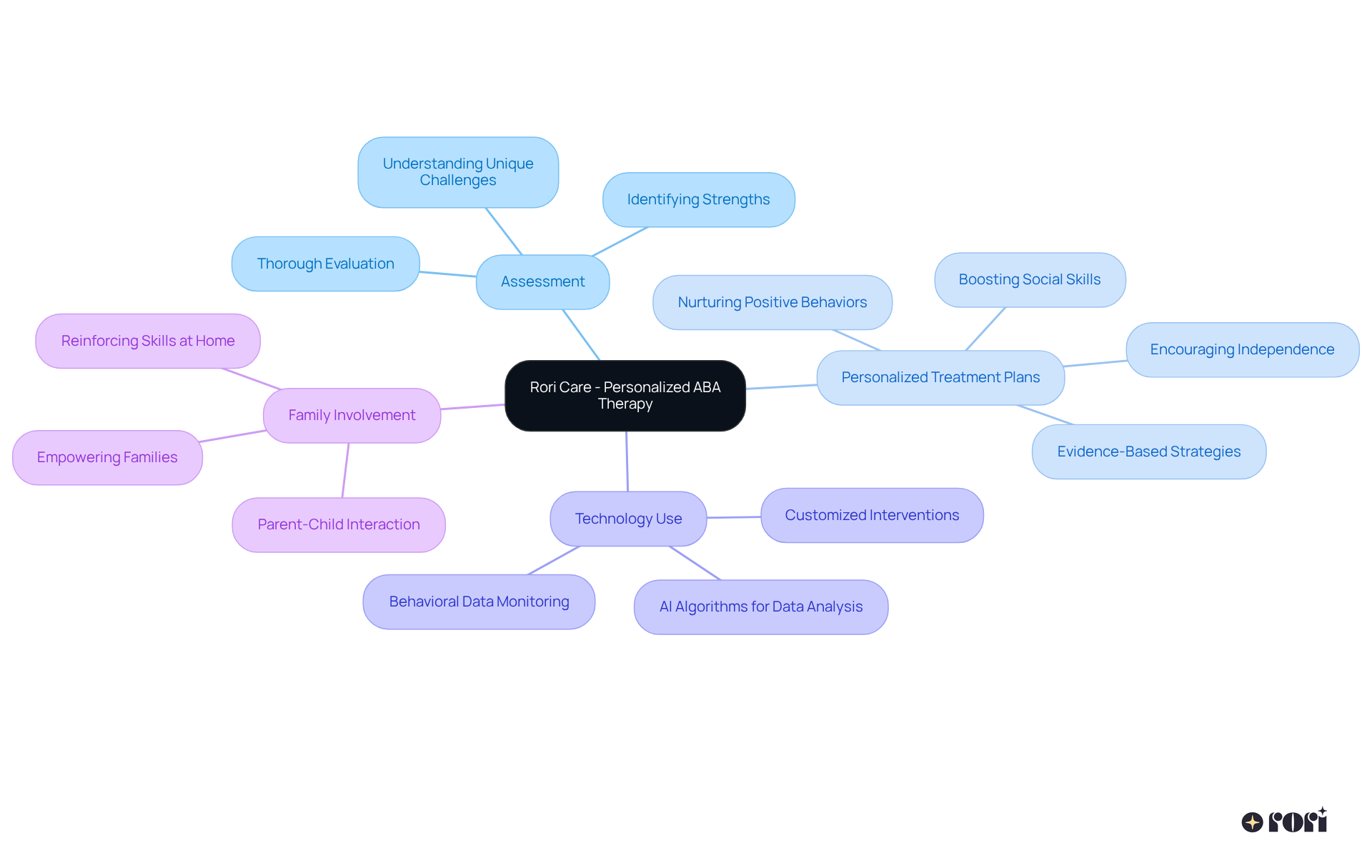
Children with moderate functioning autism frequently display a variety of characteristics that can significantly affect their daily lives. Many kids with moderate functioning autism experience challenges with both verbal and non-verbal communication, which makes it tough for them to express their needs and emotions effectively. Social interactions can be even trickier for individuals with moderate functioning autism; lots of young individuals struggle to pick up on social cues, which can lead to misunderstandings in friendships. For instance, those with moderate functioning autism might not notice when a peer is upset or could misinterpret a friendly gesture as something threatening.
Repetitive behaviors are also quite common among those with moderate functioning autism. These can appear as routines or rituals that bring comfort but may limit flexibility in social settings. It's so important for parents and caregivers to recognize these traits of moderate functioning autism, as this understanding helps them better appreciate their child's unique experiences. Experts really stress the value of early intervention and personalized support strategies for those with moderate functioning autism. Temple Grandin, a well-known advocate for awareness of developmental disorders, highlights that exposure to different experiences is key for growth. She says, "Kids have to be exposed to different things in order to develop."
Did you know that 90% of individuals with autism show progress when they fully engage in Applied Behavior Analysis therapy with active caregiver involvement? This really emphasizes the need for early intervention and the importance of parents advocating for the right support for those with moderate functioning autism.
Real-life examples can truly illustrate these communication challenges. Imagine a young person feeling frustrated because they can’t express their feelings, leading to meltdowns or withdrawal. For example, a child might struggle to communicate discomfort in a social setting, which could result in an outburst that leaves peers puzzled. These situations highlight how crucial it is for caregivers to be patient and understanding. They play a vital role in pushing for the right interventions.
By recognizing these characteristics and challenges of moderate functioning autism, families can create a nurturing environment that encourages growth and development, ultimately enhancing their child's quality of life. Let’s explore this together! We’re here to help you every step of the way!
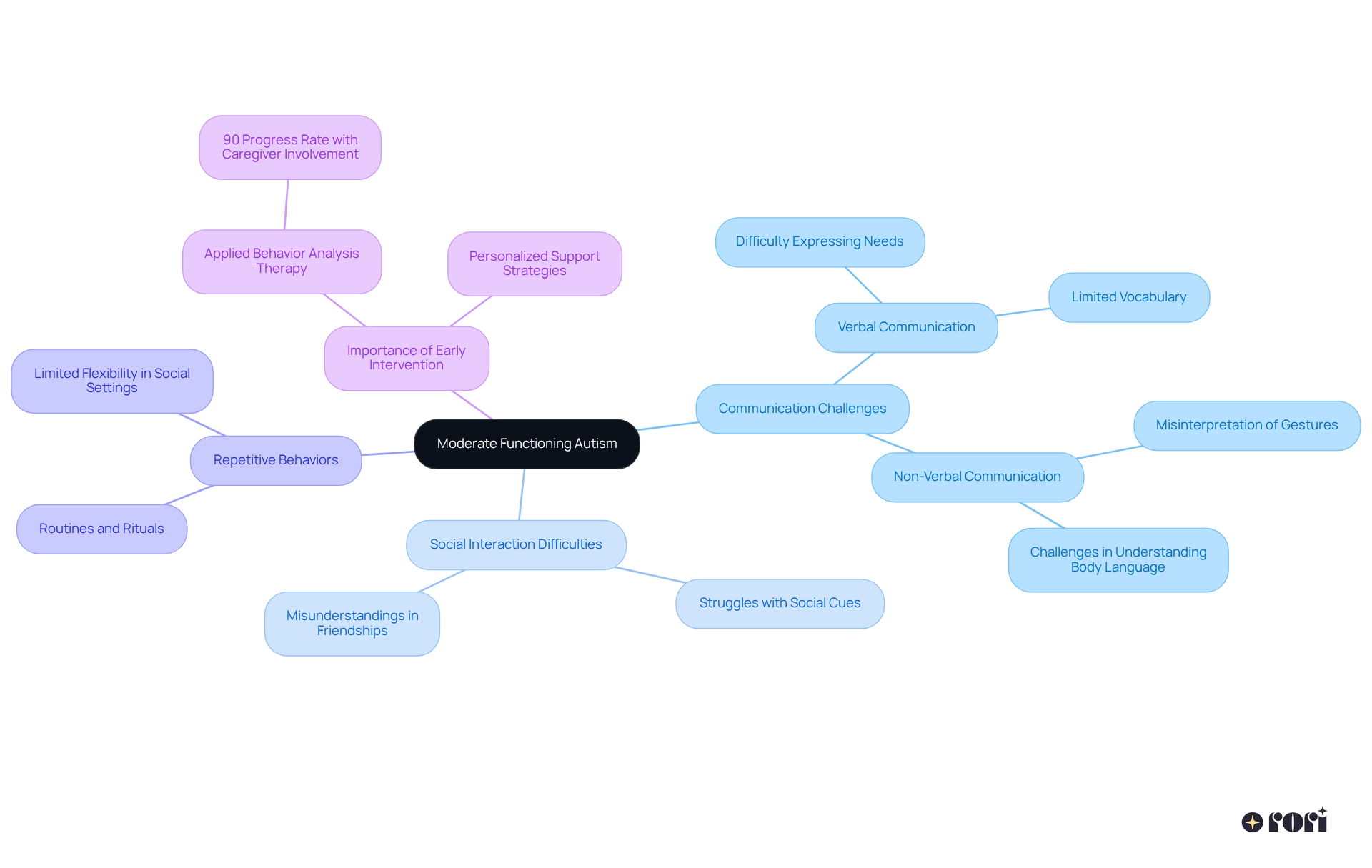
Children with moderate functioning autism often face significant behavioral and social challenges. These challenges can show up as difficulties in making and keeping friends, managing emotions, and adjusting to changes in routine. For instance, when young individuals feel overwhelmed or misunderstood, they might have meltdowns or withdraw from others. Did you know that about 73.3% of individuals and youth with autism encounter challenges in at least one functional area, like communication, social interactions, or emotional regulation? This highlights the need for focused support.
Therapists emphasize the importance of emotional regulation techniques to help young individuals navigate these hurdles. Effective methods include teaching coping strategies that enable them to recognize and manage their emotions before they escalate. Functional communication training (FCT) has shown great promise in replacing challenging behaviors with more acceptable alternatives, leading to improved social interactions.
Parents can work hand-in-hand with clinicians to implement strategies that support emotional regulation and social skills development. Successful approaches might involve:
It's worth noting that emotional dysregulation affects over 80% of individuals with moderate functioning autism (ASD), making it crucial to tackle these challenges head-on. By addressing these issues, families can significantly improve their children's quality of life and social engagement, paving the way for richer relationships and experiences. Let’s explore this together!
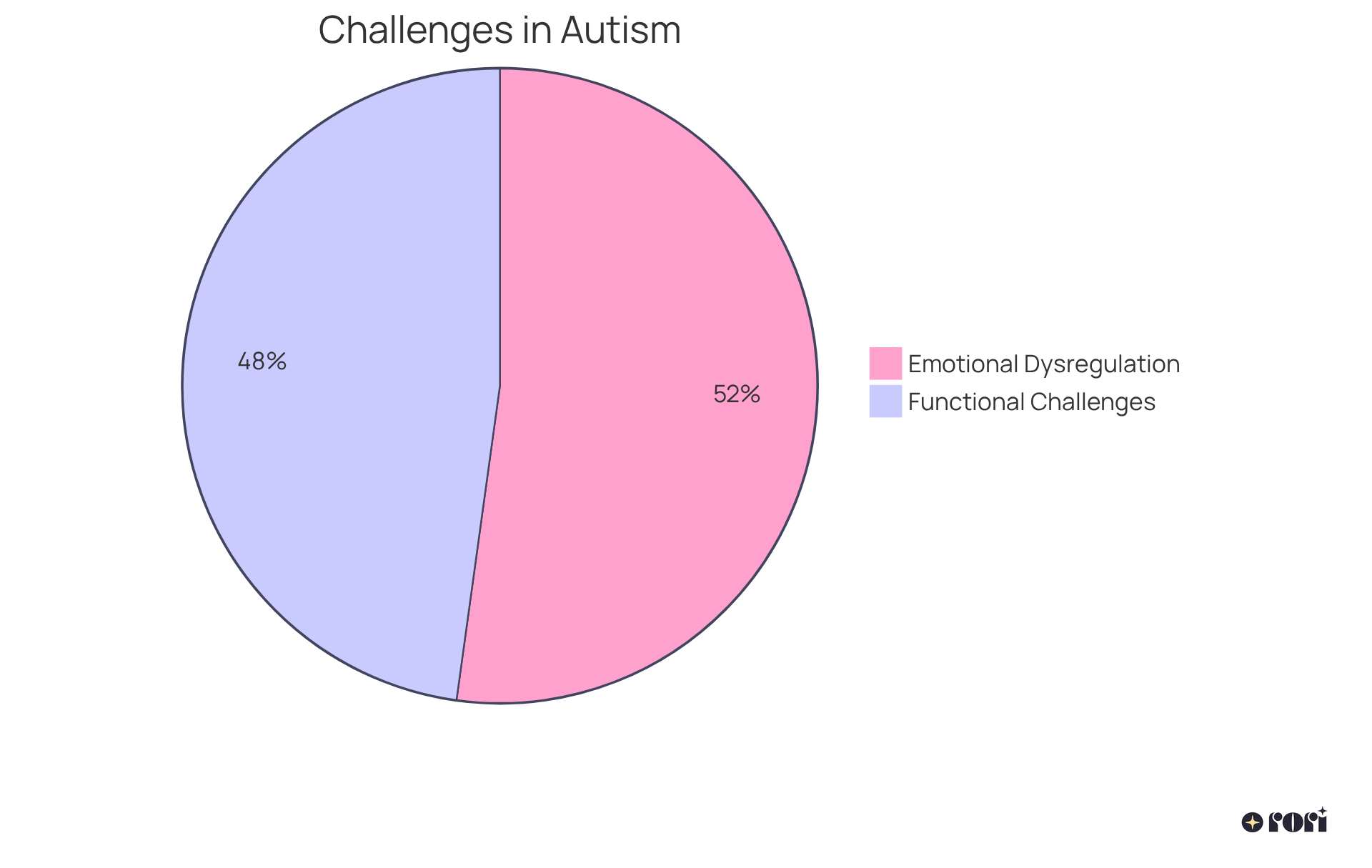
There are several effective therapies that can truly assist individuals with moderate functioning autism to grow and thrive. One of the main approaches is Applied Behavior Analysis (ABA), which focuses on reinforcing positive behaviors while gently reducing the challenging ones. Other helpful strategies include:
These can assist young individuals in boosting their communication abilities and daily living skills.
Incorporating these therapies into a comprehensive treatment plan can lead to significant improvements in a young person's overall functioning and independence, especially for those with moderate functioning autism. It’s amazing to see how these supportive therapies can make such a difference! If you’re considering these options, let’s explore this together and find the best path for your loved one!
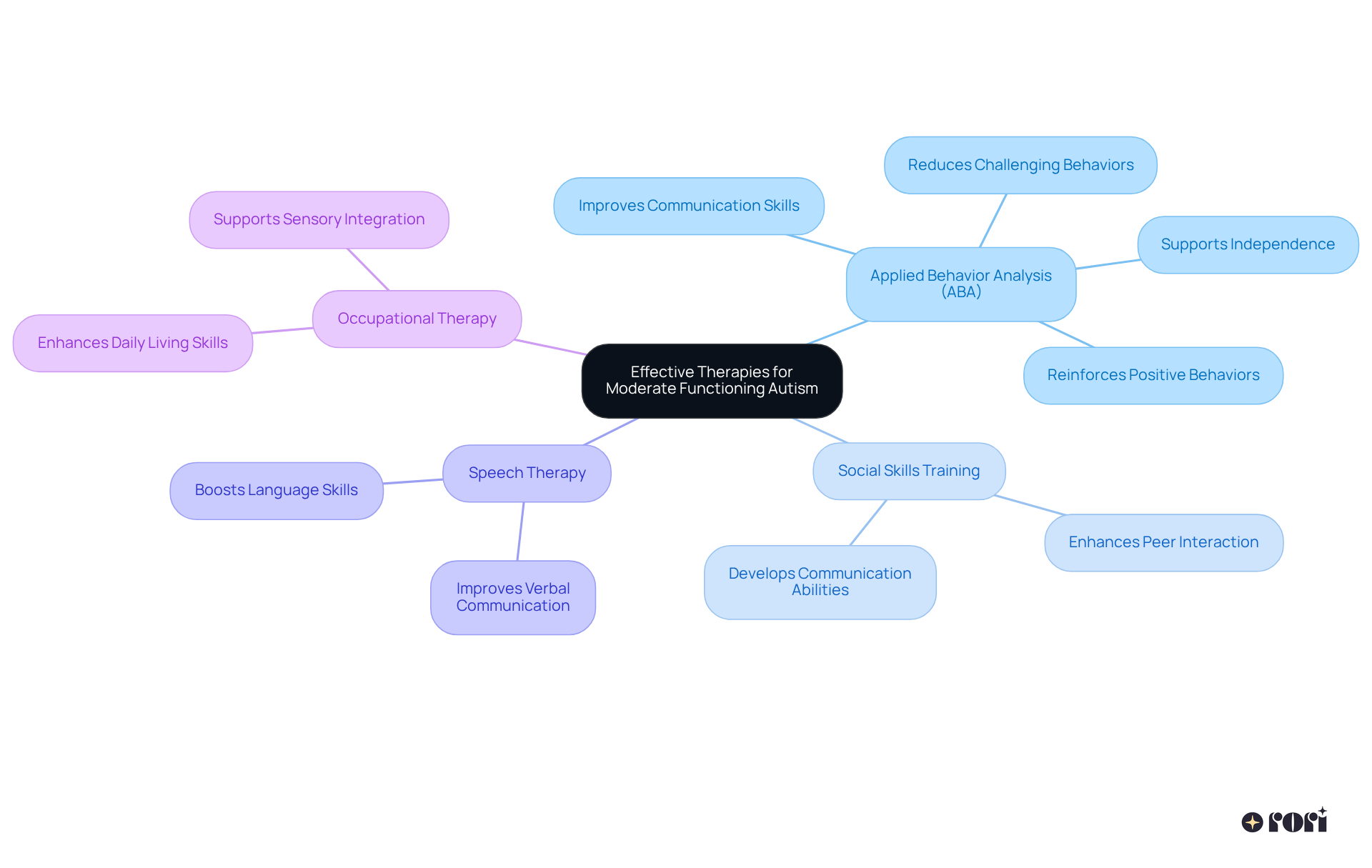
Support from family is essential for managing moderate functioning autism. Parents and relatives provide not just emotional support, but they also play a crucial role in advocating for their child's needs and enhancing therapeutic approaches at home. Engaging in family counseling can really boost communication and understanding within the household, creating a nurturing environment that benefits everyone, especially the youth. 🌟
Research shows that when relatives are actively involved, it can lead to significant improvements in a young person's development and overall quality of life. By collaborating with therapists and participating in treatment plans, families can enhance the effectiveness of interventions, ensuring their child receives the support they need for growth and independence. Plus, support groups for parents can offer valuable advice, empathy, and a sense of camaraderie, further strengthening the family unit.
As Rori Behavioral Innovations Inc. puts it, 'Participation from relatives enhances the consistency and generalization of skills learned during therapy sessions.' This really highlights how vital relatives are in their loved one's therapeutic journey. It’s important for parents to recognize the emotional energy and resilience required in this process, especially when facing the challenges of raising a child with moderate functioning autism.
To make the most of family support, parents might consider:
Let’s explore this together! We’re here to help you every step of the way!
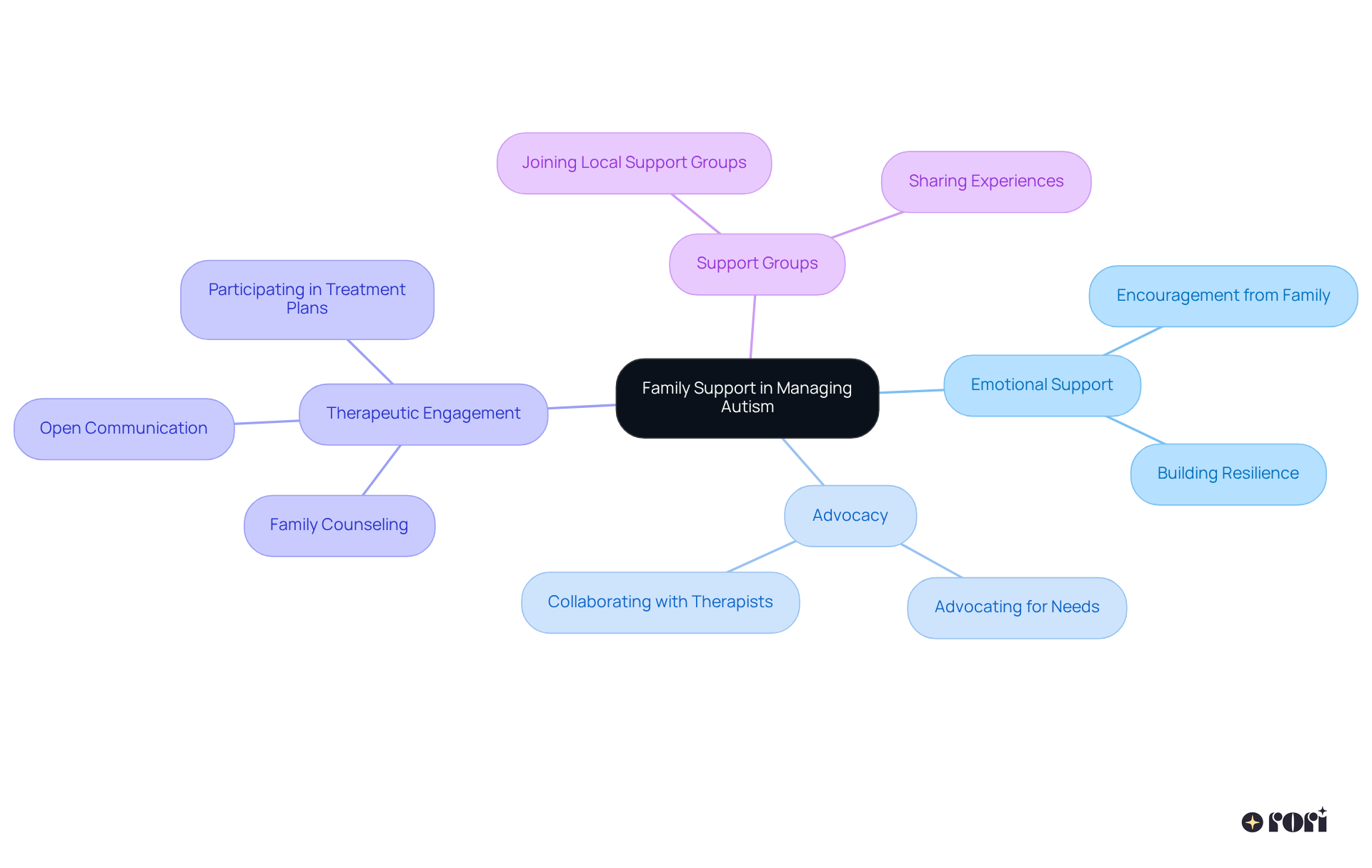
When it comes to educational strategies for kids with moderate functioning autism, creating an inclusive and supportive learning environment is key. Personalized education plans (IEPs) play a vital role here, as they are tailored to meet each student’s unique needs. This ensures they get the right accommodations and services. Did you know that over 15% of public school students in the U.S. receive special education services? This highlights just how important it is to have customized educational strategies in place.
Using visual aids and structured routines can really boost learning experiences. And let’s not forget about our teachers! Training them in moderate functioning autism awareness is crucial. Studies show that teachers who have specialized training feel more confident and are better equipped to provide the necessary accommodations, which can lead to positive outcomes for students.
Regular assessments and updates to IEPs are essential too. They help make sure that these plans remain relevant to each child’s evolving needs. As Grace E. Kim wisely points out, "An effective IEP is not static. It necessitates flexibility and a readiness to adjust according to your offspring's changing needs and progress." By fostering teamwork among parents, educators, and therapists, kids can receive comprehensive support that nurtures both their academic and social growth.
Lastly, addressing staffing shortages in special education is crucial for implementing effective IEPs. It ensures that every student gets the support they truly deserve. Let’s explore this together and make sure our children thrive in their learning journeys!
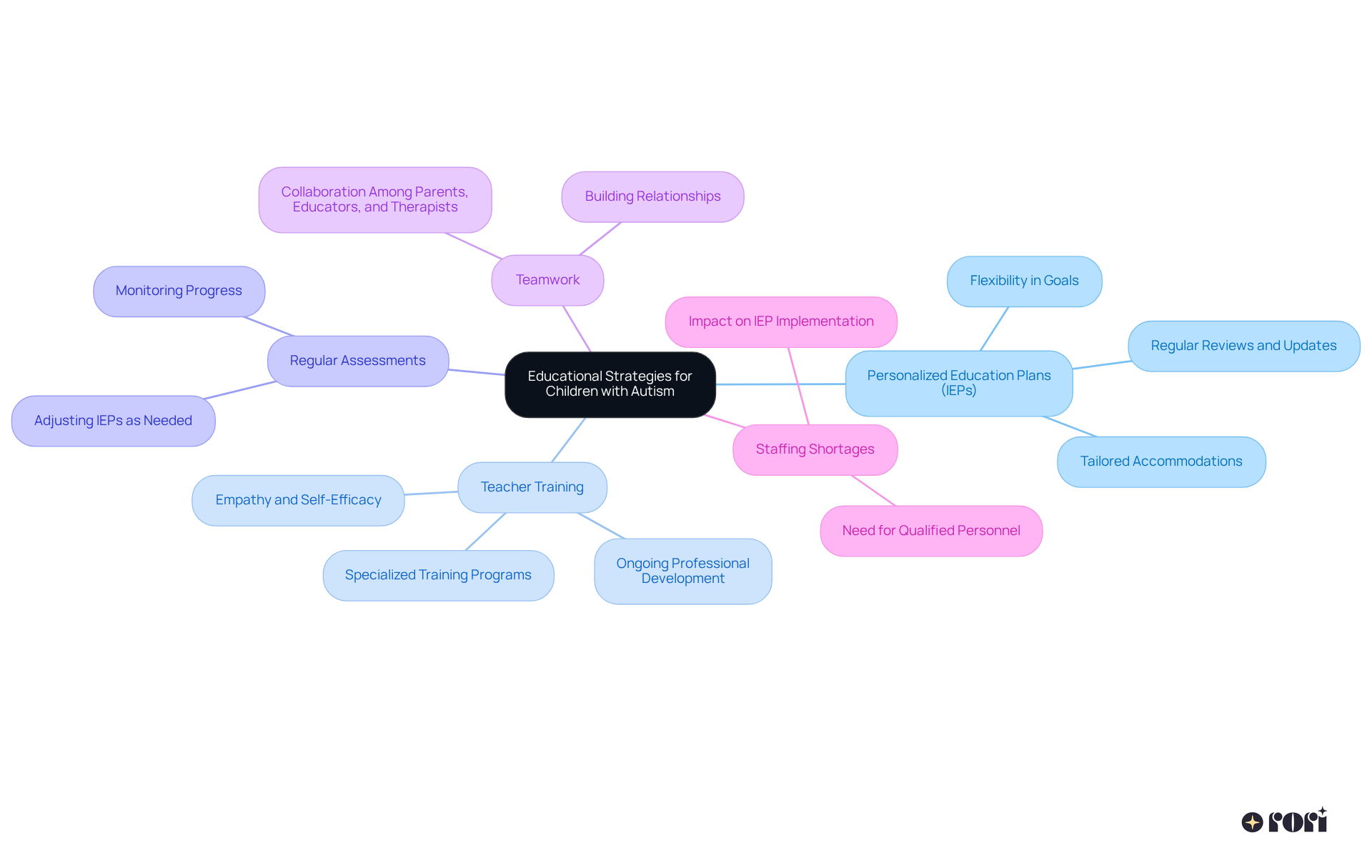
Children with moderate functioning autism often face sensory sensitivities that can impact their behavior and emotional well-being. These sensitivities might show up as heightened reactions to sounds, lights, textures, or even crowds. To create a nurturing environment, parents and caregivers can try out strategies like:
Did you know that about 1 in 36 children are diagnosed with moderate functioning autism? This highlights just how important these strategies can be!
Moreover, around 57% of individuals with ASD experience taste or smell sensitivities, underscoring the need for sensory tools to help manage these challenges. By recognizing and addressing these sensory needs, families can help their kids feel more comfortable and secure in various settings. Engaging with occupational therapists can further enhance these efforts, as they offer expert guidance on creating sensory-friendly spaces tailored to each child's unique needs.
And remember, regularly reassessing sensory preferences is key! This ensures that the strategies you’ve put in place remain effective and supportive over time. Let’s explore this together and make sure our little ones thrive in their environments!
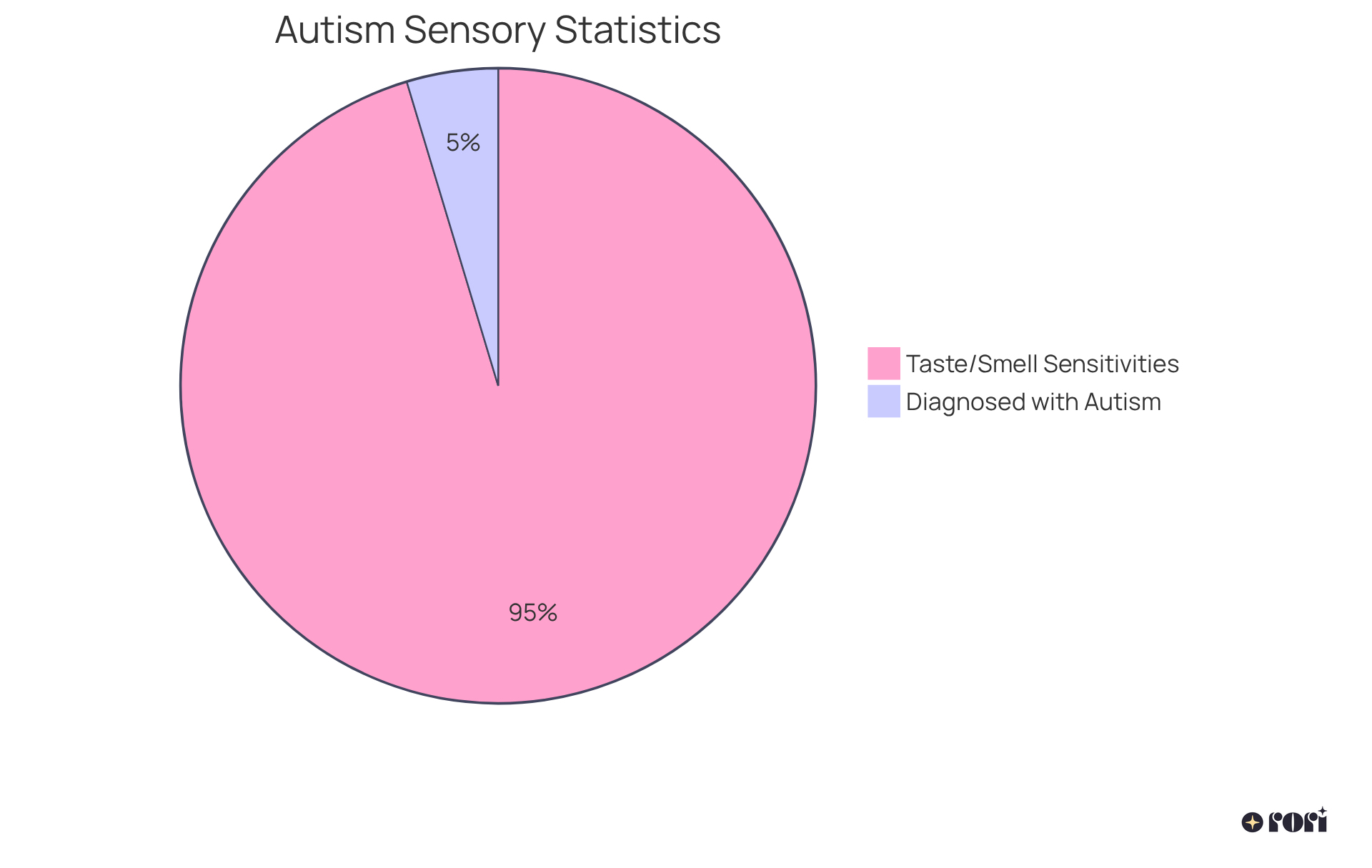
Improving communication abilities in youngsters with moderate functioning autism necessitates a thoughtful approach that is tailored to their unique needs. Visual supports like picture schedules and communication boards have shown great success in enhancing understanding and expression. In fact, research suggests these tools can boost comprehension by up to 65%! That’s a game changer for daily interactions.
Social stories and role-playing also play a vital role in building social skills, offering a safe space to practice and learn. Incorporating alternative communication methods, such as sign language or augmentative and alternative communication (AAC) devices, empowers young individuals to express their needs and feelings more effectively. Speech therapists often highlight that developing communication skills not only helps in expressing wants but also builds confidence and fosters meaningful relationships.
As parents, actively engaging in these strategies can significantly enhance your child’s ability to navigate social situations and connect with peers. This not only enriches their lives but also promotes inclusivity. Let’s explore this journey together! Your involvement can make all the difference.
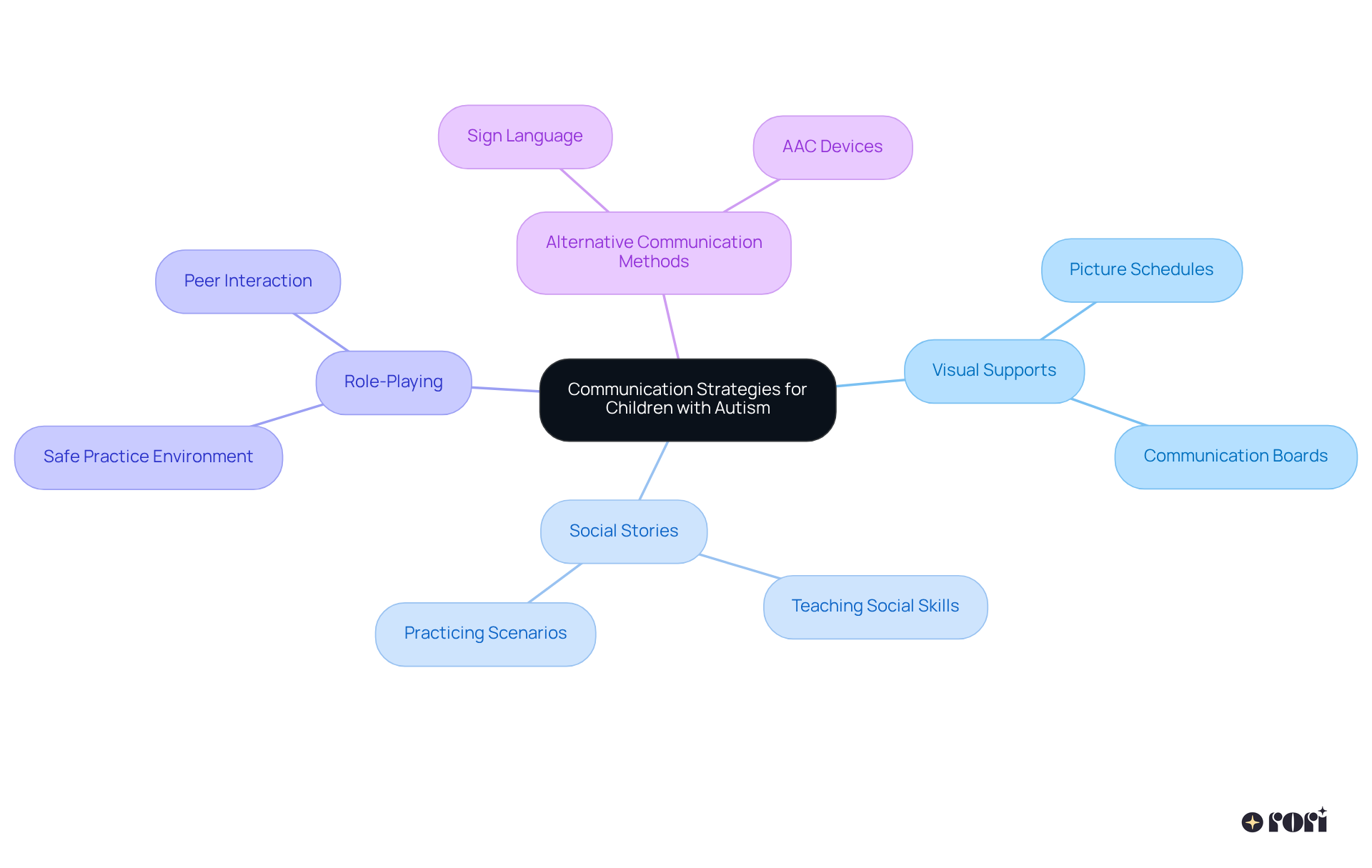
Caring for a child with moderate functioning autism can be quite demanding, making self-care super important for parents. It's essential to prioritize your physical and mental well-being. Regular exercise, seeking social connections, and allowing time for relaxation and hobbies are great ways to recharge. Mindfulness practices, like meditation or journaling, can help manage stress too! Research shows that regular meditation sessions can create a sense of inner calm for parents of children with moderate functioning autism.
By taking care of yourself, you can boost your resilience and better support your child. Establishing a strong support network can significantly reduce feelings of isolation. Did you know that 66% of caregivers seeking mental health help don’t receive it? This highlights just how crucial self-care and seeking assistance really are. Remember to carve out time for your personal interests and hobbies; it’s vital for your emotional well-being.
Chronic stress can lead to physical health issues, such as heart disease and diabetes, making self-care not just beneficial but essential. As we often hear, "Taking care of yourself isn’t a luxury but a necessity." So, let’s explore this together! You deserve to thrive, and we’re here to help you every step of the way!
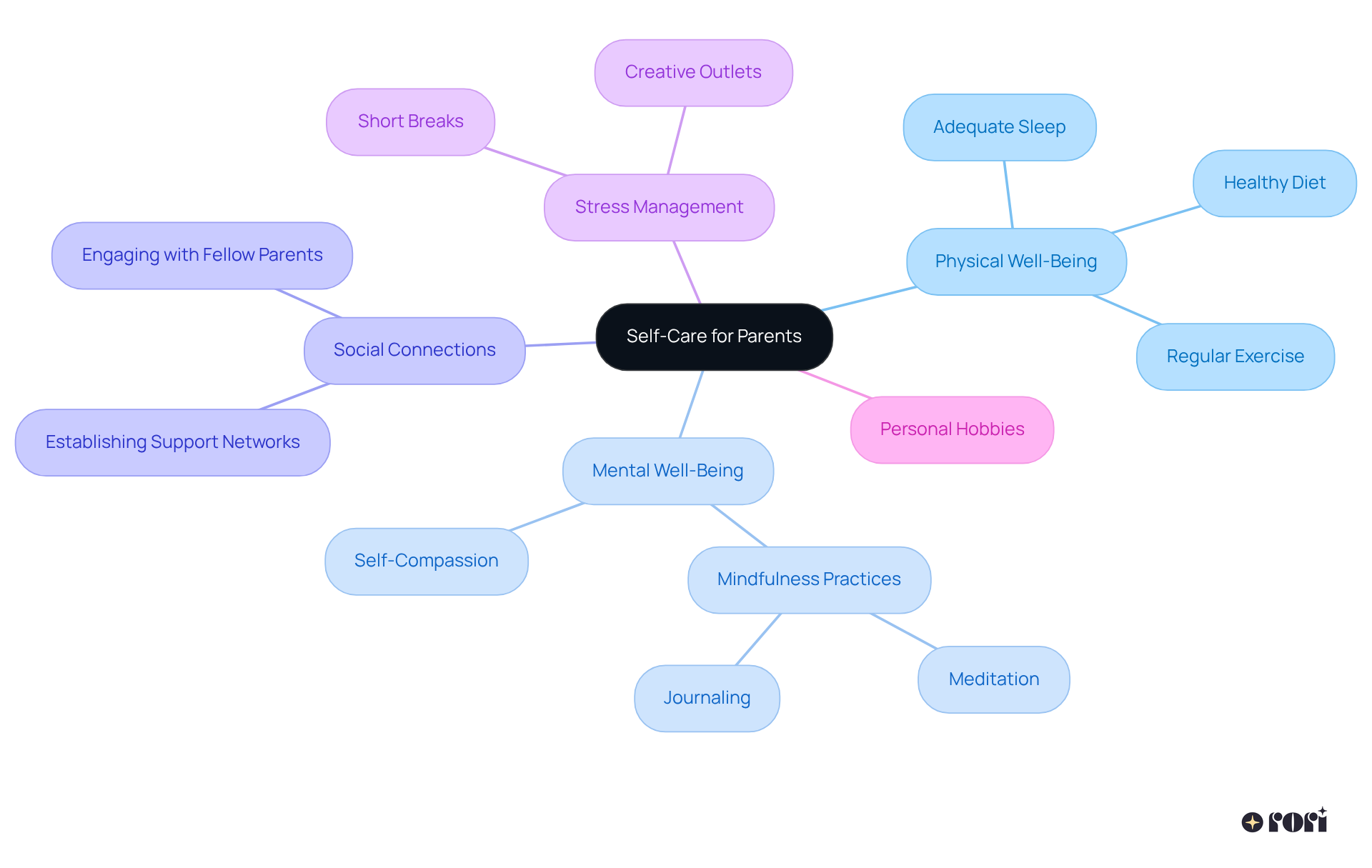
Creating a strong support system is so important for families with kids who have moderate functioning autism. Local autism support groups, educational workshops, and online forums are invaluable resources, offering both information and emotional support. Organizations like Autism Speaks and the Autism Society provide advocacy tools and connections to essential local services, including financial aid and help navigating healthcare and educational systems. By engaging with these resources, families can share experiences, gain valuable insights, and build a community that benefits both parents and children.
Parent-led ABA solutions empower families to actively participate in their child's development, fostering a sense of agency and involvement. Did you know that more than 20% of inquiries to the Autism Speaks Autism Response Team focus on community services? This highlights just how crucial these resources are! Community support groups create safe spaces for parents to connect, share challenges, and celebrate successes, ultimately reducing feelings of isolation and nurturing resilience among families on similar journeys.
These groups often provide practical support like respite care and transportation, which are vital for families facing daily challenges. Advocates for those on the spectrum emphasize the importance of these networks, reinforcing the idea that community support is key to emotional well-being. Plus, community programs like social skills groups and recreational activities offer children the chance to practice interactions in a supportive environment while allowing families to connect with one another.
By actively engaging with these community resources, parents can navigate the complexities of autism care and support more effectively. Let’s explore this together! We're here to help you every step of the way!
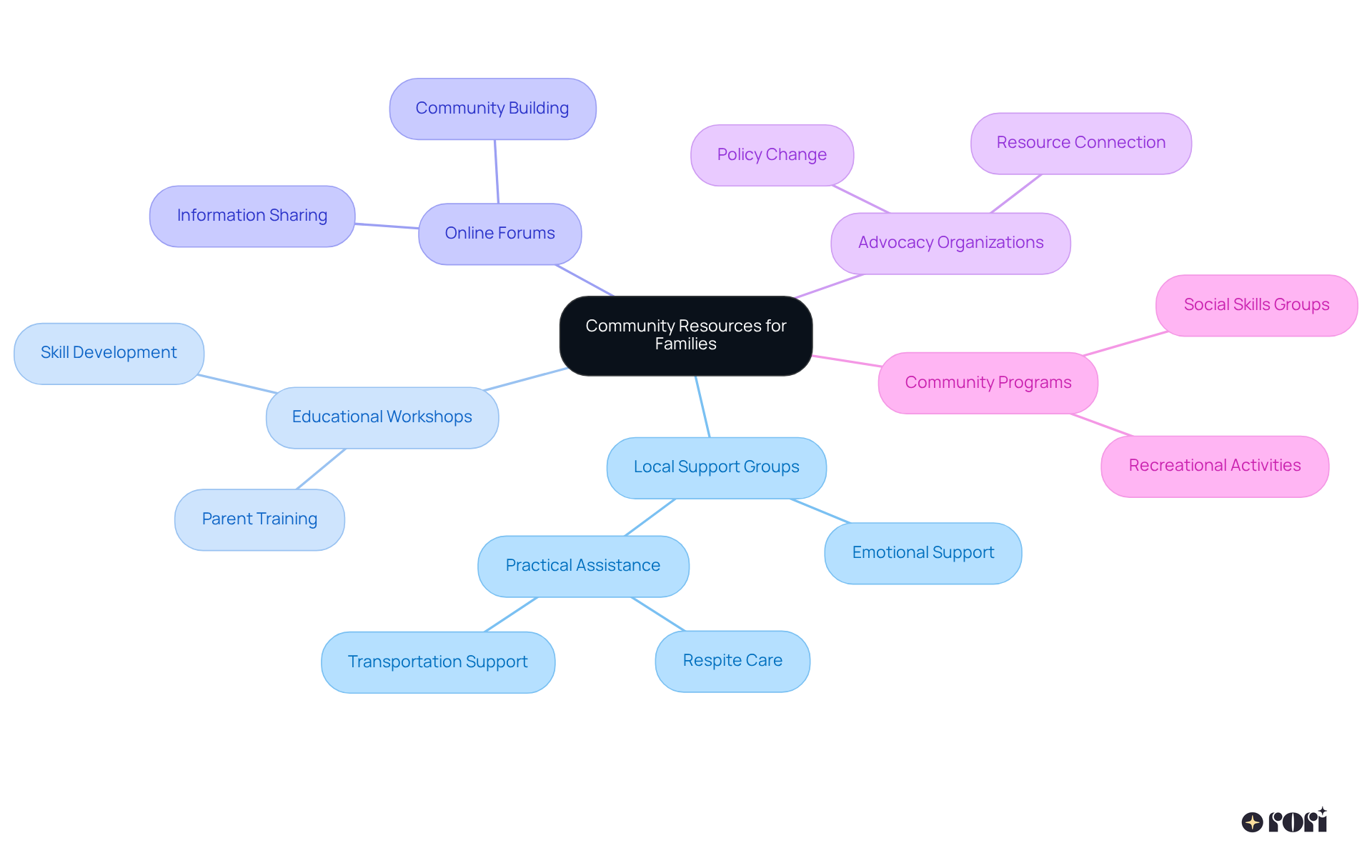
Managing moderate functioning autism can be a journey, but with the right approach, it becomes a path filled with hope and growth. By focusing on personalized support and understanding, we can build a community that truly embraces each individual’s unique needs. When caregivers tailor their strategies, they create an environment that not only encourages independence but also fosters positive interactions.
In this article, we’ve explored some key strategies, such as:
Ultimately, managing moderate functioning autism is a collaborative effort. It involves parents, educators, therapists, and the wider community coming together. By embracing these strategies and building a supportive network, families can truly enhance their children's quality of life, helping them thrive in every aspect of their development. Let’s take proactive steps today, paving the way for a brighter, more inclusive future for individuals with moderate functioning autism. We’re here to help you every step of the way!
What is Rori Care's approach to ABA therapy for children with moderate functioning autism?
Rori Care believes in personalized ABA therapy, starting with a thorough assessment by psychiatric specialists to understand each child's unique challenges and strengths. The treatment plan includes evidence-based strategies to nurture positive behaviors, boost social skills, and encourage independence.
How does Rori Care utilize technology in their therapy?
Rori Care uses advanced technology, including AI algorithms, to analyze behavioral data and create tailored interventions, ensuring that each individual receives the most effective support to thrive in their daily lives.
What role do parents play in ABA therapy at Rori Care?
Parents are crucial to the success of ABA therapy. Rori Care is committed to empowering families and ensuring that therapy remains relevant and engaging for each young person.
What are some key characteristics of moderate functioning autism?
Children with moderate functioning autism may experience challenges with verbal and non-verbal communication, struggle with social interactions, and exhibit repetitive behaviors. They often find it difficult to express their needs and emotions, which can lead to misunderstandings in friendships.
Why is early intervention important for children with moderate functioning autism?
Early intervention is vital as it helps children develop better communication and social skills. Research shows that 90% of individuals with autism show progress when engaged in Applied Behavior Analysis therapy with active caregiver involvement.
What are some common challenges faced by children with moderate functioning autism?
Common challenges include difficulties in making and keeping friends, managing emotions, and adjusting to changes in routine. Many children may experience meltdowns or withdrawal when feeling overwhelmed or misunderstood.
What techniques can help children with moderate functioning autism manage their emotions?
Therapists emphasize emotional regulation techniques, including coping strategies to recognize and manage emotions before they escalate. Functional communication training (FCT) can also replace challenging behaviors with more acceptable alternatives.
How can parents support their children with moderate functioning autism?
Parents can work with clinicians to implement strategies that support emotional regulation and social skills development, such as establishing structured routines, providing social skills training, and creating opportunities for peer interactions in nurturing environments.